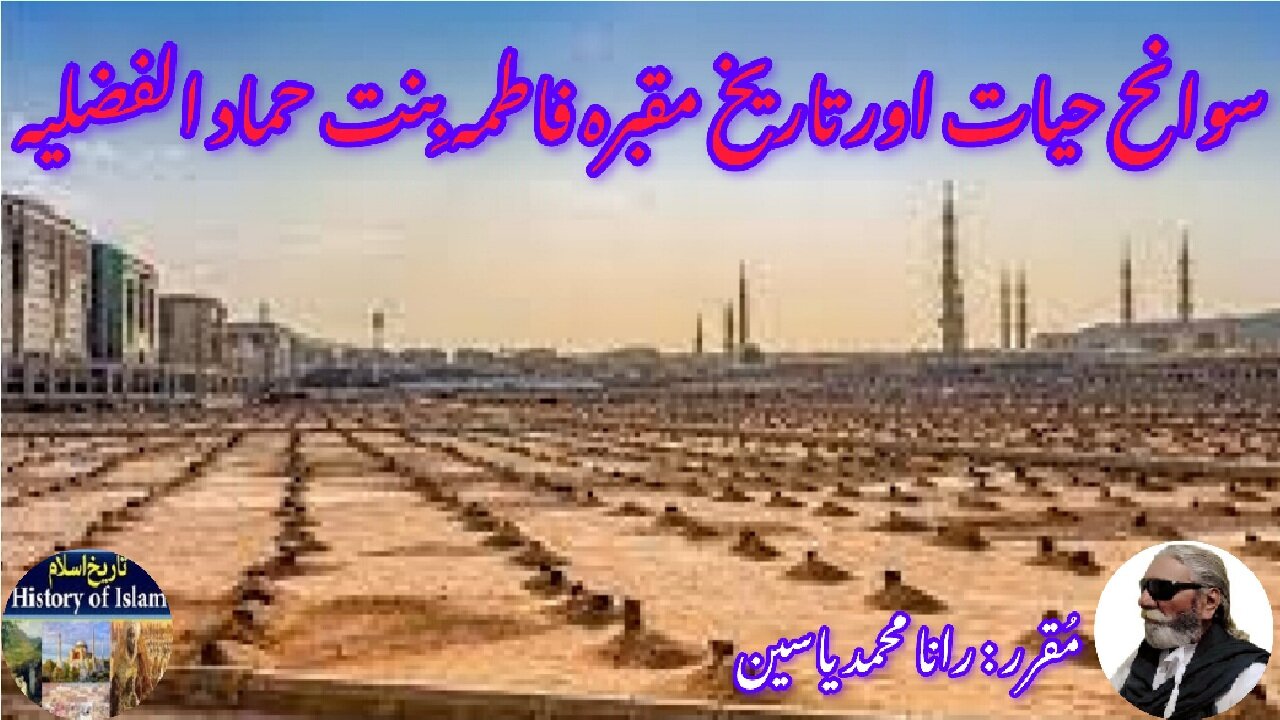Premium Only Content

Fatima bint Hammad al-Fadliyah & her shrine فاطمہ بنت حماد الفدلیہ کی سوانح حیات اور مزار کی تاریخ
@islamichistory813 #fatimabinthamadalfudayliyya #sufisaint #cultural #heritage #biography #islamic #mysticism #islamic #philosophy #shrine #historical #figures
Biography of Fatima bint Hamad al-Fudayliyya and the history of his shrine
Dekhti Aankhooon aur sountay kaanoon ko Asslamoalaikum, sisters, brothers friends and elders, in informative series videos of Islamic Women ascolars, sufisaints, cultural heritages, islamic philosophys, islamic mysticisms and historical women figures. today we are describing biography of Fatima bint Hamad al-Fudayliyya and the history of his shrine.
Fatima bint Hamad al-Fudayliyya, also known as Al-Shaykha al-Fudayliyya, was a distinguished Islamic scholar and hadith expert who lived during the 18th and 19th centuries. Born into a scholarly family, Fatima was one of the most renowned female scholars of her time and is remembered as one of the last of a long line of female *muhaddith*—experts in the science of hadith transmission. Her life’s work stands as a testament to the contributions of women to Islamic scholarship, particularly in the areas of hadith and Islamic jurisprudence. Her name has endured for generations as a symbol of intellectual prowess, spiritual commitment, and perseverance in the face of challenges.
Fatima bint Hamad was born in the late 18th century, around the 1760s, in the region that is now part of modern-day Syria. Though exact records of her birth date are not widely available, it is generally agreed that she was born during a time when the Islamic world was undergoing significant political and intellectual changes. Syria, at the time, was a hub of Islamic scholarship, particularly in the city of Damascus, where scholars gathered to study and teach religious sciences. Fatima's family was known for its strong connection to the Islamic scholarly tradition, and she grew up in an environment that nurtured her intellectual and spiritual development. Her father, Hamad al-Fudayliyya, was a respected scholar, and from a young age, Fatima was immersed in the study of the Qur'an, hadith, and Islamic jurisprudence. It is said that her early education was marked by the guidance of renowned scholars and teachers, who recognized her exceptional intellect and keen memory.
Fatima’s academic achievements were impressive, especially given the cultural and societal context in which she lived. In a time and place where women were often excluded from formal religious scholarship, Fatima broke barriers by studying hadith, a field dominated by male scholars. She dedicated herself to the meticulous science of hadith transmission, learning the intricate methods of verifying the authenticity of narrations attributed to the Prophet Muhammad (PBUH). As a *muhaddith*, Fatima became an authority in the field of hadith studies, and her expertise earned her the respect of many of her male contemporaries. Her contribution to the preservation and transmission of hadith literature was significant, and she was known for her accuracy, rigor, and dedication to scholarly integrity.
Fatima’s intellectual legacy was not confined to hadith alone; she was also a respected jurist. Her deep knowledge of Islamic law (*fiqh*) and her ability to interpret and apply legal principles made her one of the foremost female scholars in her field. She taught and transmitted knowledge to a generation of students, some of whom would go on to become respected scholars themselves. Fatima’s role as a female teacher in a patriarchal society was groundbreaking, and she became a role model for many women who sought to pursue Islamic scholarship. She was not only a scholar in the traditional sense but also a spiritual guide and mentor, helping her students navigate both the intellectual and practical aspects of their faith.
Al-Shaykha al-Fudayliyya's contributions to Islamic scholarship extended beyond her formal teachings. She was a prolific author, and her written works covered a wide range of topics, from hadith to jurisprudence, and her writings continue to be studied by scholars today. Her influence spread throughout the Muslim world, and her reputation as a knowledgeable and pious scholar reached beyond Syria and the Levant. Despite the obstacles she faced as a woman in a male-dominated field, Fatima's work helped to ensure that her name would be remembered in the annals of Islamic history.
Fatima bint Hamad al-Fudayliyya passed away in 1831, leaving behind a legacy that continues to inspire scholars, particularly female scholars, in the Muslim world. Her death marked the end of an era for female scholars of hadith, as she is regarded as one of the last in a long tradition of women who had contributed to the preservation of hadith and the transmission of Islamic knowledge. Her passing, however, did not diminish her impact, and her work remains influential to this day.
Fatima was buried in Damascus, a city that was central to her life’s work. Her grave is located in the famous Bab al-Saghir Cemetery, which is home to the tombs of many prominent figures in Islamic history. The location of her grave has become a site of reverence for those who recognize her contributions to Islamic scholarship. Over time, a shrine was constructed near her tomb, commemorating her life and work. This shrine, built by her followers and admirers, serves as a place of pilgrimage and reflection for those who seek to honor the memory of a woman who defied the societal constraints of her time to become one of the greatest scholars of her generation.
The shrine of Fatima bint Hamad al-Fudayliyya continues to be an important site for the faithful, particularly those who come to pay homage to a woman who demonstrated that intellectual excellence and piety are not confined by gender. The building of the shrine was an act of devotion by her followers, who sought to preserve her memory and ensure that future generations would recognize her exceptional contributions to Islamic scholarship. The shrine, which stands as a symbol of her enduring legacy, is a testament to the respect and reverence she commanded in life and continues to inspire today.
In summary, Fatima bint Hamad al-Fudayliyya, also known as Al-Shaykha al-Fudayliyya, was an influential Islamic scholar and hadith expert who made significant contributions to the fields of hadith and jurisprudence. Born in the late 18th century in Syria, she dedicated her life to the pursuit of knowledge, overcoming the gendered barriers that often restricted women in the scholarly world. Her works, teachings, and spiritual guidance have left an indelible mark on Islamic scholarship, and her legacy lives on through her writings and the shrine that honors her memory.
With this, we ask for your permission until tomorrow, and tomorrow we will be described biography of Asmau bint Shehu Usman dan Fodiyo and history of her shrine, at the end we pray to Allah Almighty to grant us the abilitty to act on the Quran and Hadith, Amen
Allah Hafiz
=============================
-
 9:31
9:31
ISLAMIC HISTORY
1 day agoIslamic History Episode 238 Mutawakkil's circumstances and sincerity متوکل کے حالات و اخلاص
3 -
 22:53
22:53
Jasmin Laine
1 day agoParliament ERUPTS After "WORST Decision EVER!"—Carney Left SPEECHLESS by SHOCKING Report
29.7K71 -
 11:50
11:50
Mrgunsngear
1 day ago $7.44 earnedSteiner MPS Enclosed Red Dot: Better Than The ACRO P2? 🔴
28.5K17 -
 1:27:55
1:27:55
Sarah Westall
1 day agoSelecting World Leaders: Intelligence No Longer a Prerequisite w/ Martin Armstrong
38.2K21 -
 2:03:07
2:03:07
Badlands Media
23 hours agoDevolution Power Hour Ep. 393: Synthetic Reality, and the RICO Grande Strategy
65.2K19 -
 11:23:18
11:23:18
GritsGG
12 hours agoQuad Win Streaks!🫡 Most Wins in WORLD! 3600+
77.3K10 -
 41:16
41:16
MattMorseTV
7 hours ago $77.29 earned🔴Antifa is PREPARING for WAR.🔴
74.7K426 -
 2:55:38
2:55:38
cosmicvandenim
14 hours agoCOSMIC VAN DENIM | Horror Game | STOREBOUND
27.1K3 -
 50:18
50:18
Side Scrollers Podcast
7 hours agoLIVE SPECIAL EVENT - Blabs SPITS on Her Ancestors by BURNING Pasta
50.1K8 -
 6:18:07
6:18:07
putther
6 hours ago $2.26 earned⭐ Bounty Hunting on GTA Online & GTA 5 RP ❗
37.4K